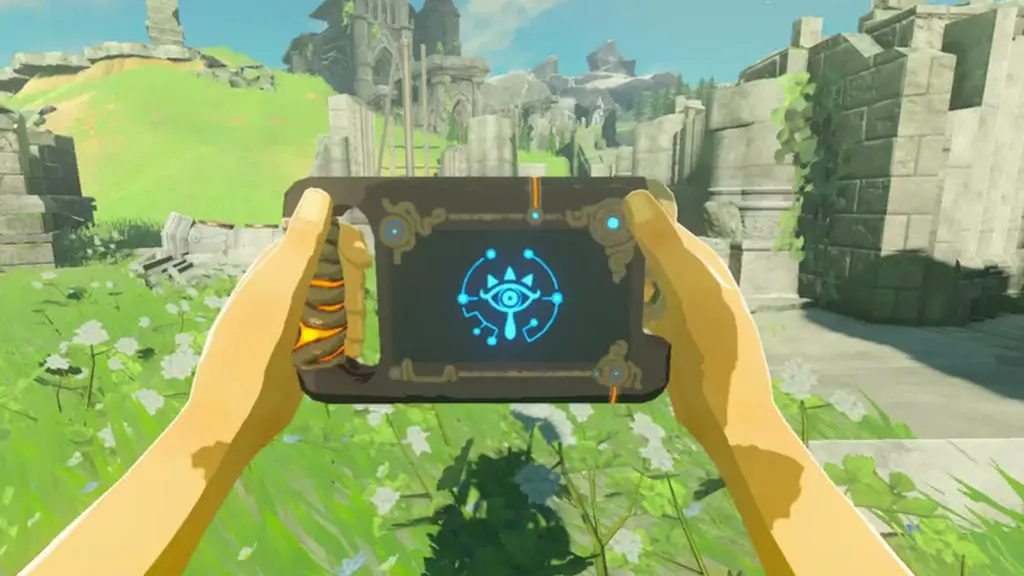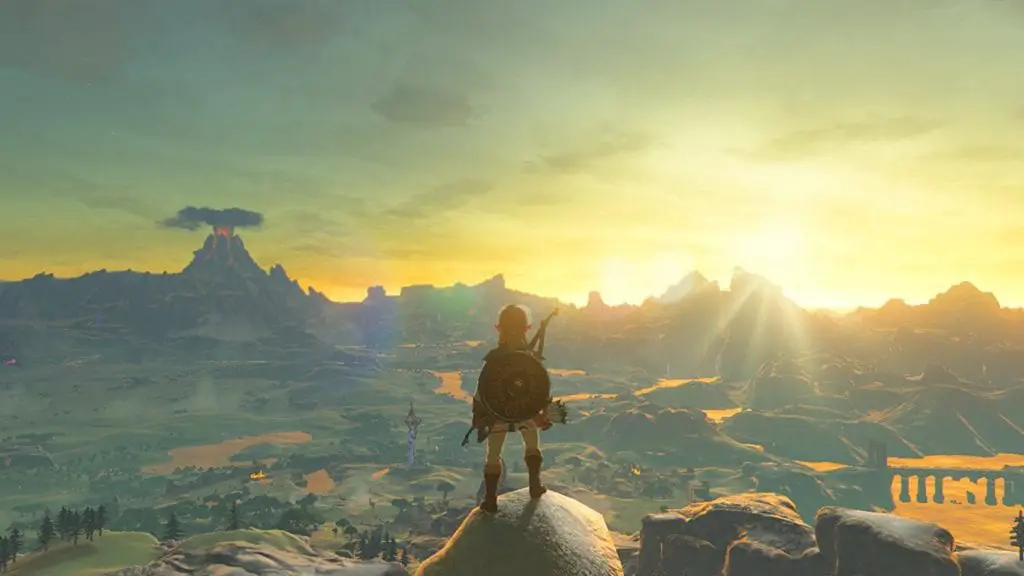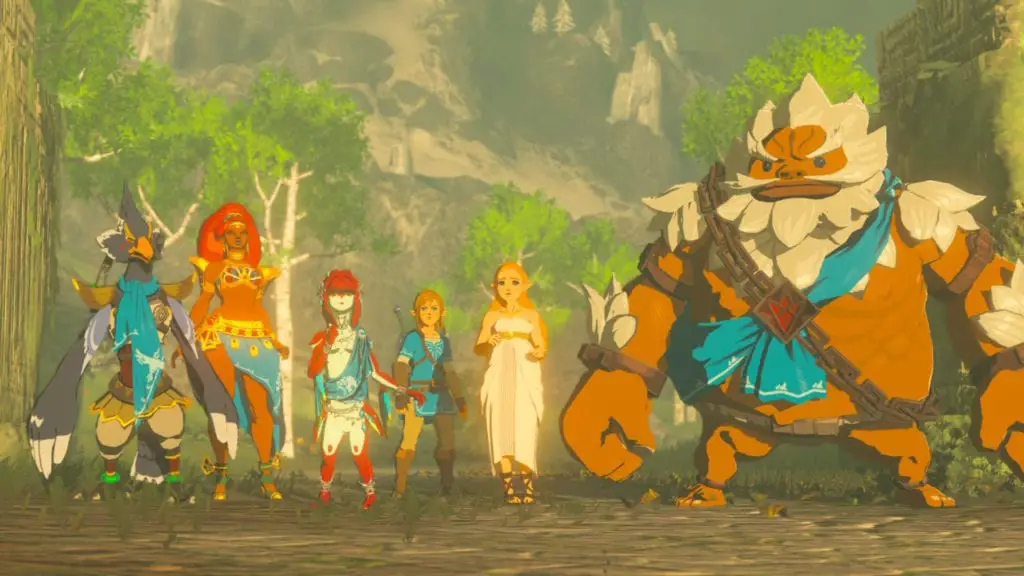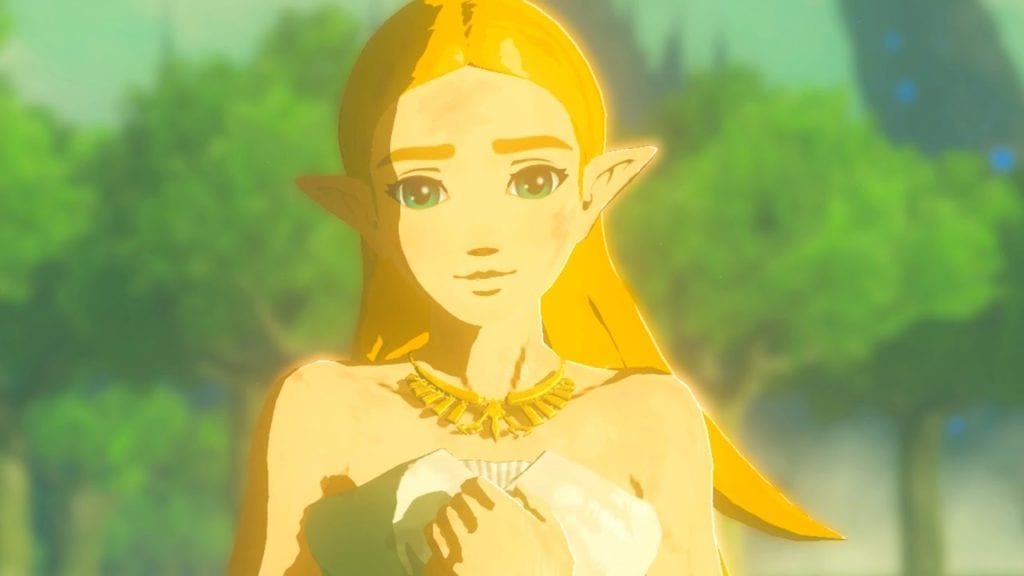Warning: Major Spoilers for Legend of Zelda: Breath of the Wild!
On March 3rd of this year, a brand new Legend of Zelda (LoZ) title was released out into the *ahem*… wild. This most recent visit to the beloved Hyrule universe entitled Breath of the Wild (you see what I did in that first sentence?) promised to add more depth, more freedom, and more gameplay than any LoZ game that preceded it.
Being the type of person known for prolonging his own happiness, I didn’t end up picking up the game until halfway through the summer…but at last…I have completed it on my own time. Amidst upwards of a hundred hours of gameplay that I sunk into Breath of the Wild’s completion, amidst the countless shrines unlocked, Korok seeds uncovered, mountains climbed, towers erected, weapons found and puzzles solved, at the heart of all this open-world goodness lays the true reason I, and so many others return to Hyrule: to experience the intimate story of Link’s Hero’s Journey.
The Call to Action/ Supernatural Aid
The journey begins with Link, the Hero of Time, awakening from one of the most epic naps in videogame history: a one-hundred-year slumber. “Open your eyes Link,” a soft, mellifluous voice from an unknown source calls him to action, and Link crawls out of a vat in the same way one might drag themselves to their Friday morning “Ethics” course after a night of binge-drinking. Irony is great.
Anyway enough about my early twenties. Link soon receives his supernatural aid: his smartphone -errr- his Sheikah Slate to which I absolutely didn’t immediately peruse Amazon for a replica Iphone case. So it’s not with a ferry this time around with whom we navigate the world, but with modern technological advances. Great, as if our hero wasn’t gauche enough, he’s just gonna have his head buried in his phone for this entire adventure! Damn Millennials.

Themes and Characteristics
Link, aside from being a walking “Intro to Stoicism” course, also has amnesia. In Breath of Wild this vital character trait, or rather, character flaw is taken full advantage of from both a gaming and story arc prospective. He awakens, he is lost and unaware of his surroundings, he receives his Sheikah Slate, then he wanders out into a sprawling field without knowing where, or even who the hell he is. It’s now up to you the player to discover it for him.
This amnesiac flaw works on a Meta level as well, of course. For, what I’m assuming to be most players of this game, this is not our first time in Hyrule, but a reintroduction. Like Link, we are plunged into a world that we are told should be familiar to us, but, in sheer scale alone, this Hyrule is like nothing we’ve ever experienced before. It’s dangling nostalgia over our heads in such an astonishing way without wholly relying on it, because recurrence and nostalgia have actually become part of the setting and canon itself:

You remember Hyrule right? You’ve been to all the locations, you’ve defeated Ganon in the past, haven’t you? And this Princess said to be containing the evil within the castle…you remember her too right? Well, somewhere in this vast, unending version of Hyrule, you might just reconnect with all that … but good luck getting there.
This could be considered to some as a crutch, a way to recycle old material, but that’s a necessary hurdle for anyone to jump over when their product is storytelling. Yes, they often recycle the same cast of major characters and often return to Hyrule, but what LoZ does so much better than most other franchises bent on continuing their consumable narratives, is use these characters as tools to explore different themes within said characters, and use their setting to aid in a unique story. In Majora’s Mask they explore chaos and grief in the land of Termina.
In Twilight Princess, A Link To The Past, and A Link Between Worlds they explore the duality. Ocarina of Time explores the effects of becoming an adult with two different time periods of Hyrule. So the purpose of, say, the hundred-year time skip in Breath of the Wild is to connect you to the past within Breath of the Wild’s story, not to make cheap references and not-so-subtle connections to other titles the way so many reboots nowadays rely so heavily upon. With LoZ, it has always been the themes and the character journeys to come first.
There are two strong themes that come to mind when speaking of just the setting itself: Freedom and choice. With Hyrule’s new sense of sprawling open-endedness, unique only to Breath of the Wild, it is vital for Link to explore, to get lost, to discover and uncover every secret in every corner of Hyrule. This childlike thirst for adventure is a rather important character quality that will in turn help Link overcome his amnesiac character flaw. Now if only he had someone to point him in the right freaking direction…
The Threshold Guardian, The Sage, and The Prophecy
The first character you run into as Link is an old man by a fire. He just happens to know like a ton of Hyrule history, which is rather helpful, and he reveals himself to be the ghost of King Rhoam, Zelda’s father, and then gives Link a paraglider to fulfill his role as the Threshold Guardian.
Rhoam’s gift gives Link the key to leaving his “home” and fulfill his destiny. Link then traverses to Kakariko village to find Impa, the sage who tells him of a prophecy.
There is a princess (Zelda) with a sacred power and her appointed knight (Link), chosen by a sword that seals the darkness, as well as four Divine Beasts piloted by four champions that will help defeat the great evil. A hundred years ago upon Ganon’s return, they failed. Ganon seized control over the divine beasts and turned them against the peoples of Hyrule, killed the champions and laid waste to the Kingdom. Damn.
Impa, fulfilling her role as the sage has a very important message for Link, but since Link has lost his memory, she isn’t sure you are ready to hear what happened. This pattern follows Link around the entire story. Legend tells of a hero that would return, and people recognize the Sheikah Slate but refuse to believe that Link is Link. So let’s add inferiority complex to our amnesiac identity crisis. So far so good.
“I’ve been waiting one-hundred years to deliver the princess’ message… HOWEVER…if you are to hear them, you must be prepared to risk your life as well…not a memory to your name yet you are as intent as ever to charge forward with only courage and justice on your side.”-Impa
Temptations
Through travel, and uncovering places in Hyrule, your lack of memory plagueing you throughout the journey begins to reveal itself. It’s not by accident that Link’s struggle for autonomy, for agency and for understanding one’s destiny is in direct parallel with the character arc of Zelda.
You discover that Zelda has torn feelings towards her appointed knight. He is a living embodiment of her own limitations. She knows that she is capable of great things, and she is determined to access her sealing powers and fulfill her destiny to defeat Ganon all by herself.
“I thought I made it clear that I’m not in need of an escort… I, the person in question am fine, regardless of the king’s orders.” -Zelda
Though she longs to be given independence, she is constantly being undermined and over protected, causing her to make rash, or even careless decisions; or as Daruk, the Goron’s champion puts it,
“She has a strong personality–so strong she can’t quite see the range for the peaks.”
Zelda, our tragic princess is so concerned with getting all the details about the divine beasts correctly and proving her capability, that she neglects discovering her sacred power. By avoiding her destiny, she bears the responsibility of Hyrule’s destruction.
Before the Calamity however, Zelda is at one point impressed, envious even, of Link’s dedication and devotion to his path. But she projects her complex struggle onto Link concerning her own path. A question that makes Link ponder: How can any of us be sure? This temptation could lead to his straying away from his destiny.
“I see now why you would be the chosen one. What if one day you realized you weren’t meant to be a fighter? Yet the only thing people ever said was that you were born into a family of the royal guard, and so no matter what you thought, you HAD to become a knight? If that was the only thing you were ever told, I wonder then, would you have chosen a different path?”
So here is Zelda’s tragic downfall: her fears and anxieties about having her path laid out for her. She sees how determined and sure Link is of his path, and this bothers her because she wonders if she would be someone entirely different were she given the choice.
“My hope is that you’ll allow me to contribute here in whatever way I can”
she says to her father on the ramparts of Hyrule castle. She wants to help with the guardians and the divine beasts, with all the extensive knowledge she possesses on the subject, but her father forbids it until she finishes her training on how to seal Ganon away. Her father is aware of how the people see him as a failure, that he would allow for Ganon to return to the realm unchecked, and he won’t allow for the same fate to befall his daughter.
Challenges
Your destiny to save Zelda soon becomes much more meaningful once you discover the memory of when she saves you. Her power is unlocked only when Link’s life is most at risk. But how is it that past Link is so sure of his destiny? How is it that he understands his power so confidently? This is where the time loop plays out so nicely, because it is upon the death and resurrection of the hero, where Zelda saves Link and our story begins that she finally realizes hers and your destinies are directly *umm* LINKED. In order to stop Ganon, her role is that she must save you from making the same mistakes she made. She must make sure that you remember who you are, that you remember to save her as well. She cannot defeat this evil on her own, and neither can you.
This is where the roles of the divine beasts come fully into play; they are the challenges of which Link must overcome. Only upon defeating Ganon’s monsters can he begin his transformation into the hero he was always meant to be: a hero that unites the peoples of Hyrule and exhibits the best qualities of the champions, the friends he surrounds himself with.
Revali of the Rito clan is your competitive rival. He’s the most talented archer in Hyrule, but he’s cocky and pig-headed and Windblight Ganon defeats him. But upon freeing Revali’s spirit, he grants you a gift: Revali’s Gale.
Gale. noun. a very strong wind OR a burst of sound, especially laughter.
So although Revali’s cockiness was his downfall, what comes out of it is a character quality that Link can possess, and if he can control the Gale, he can use it to his strength. This is likewise for all the champions. Daruk of the Goron’s gives Link the gift of protection, despite the fact that Breath of the Wild focuses so heavily on overprotection having negative effects on characters like Zelda and Yunobo in the Goron story. Urbosa of the Gerudo gives Link the gift of her fury and Mipha of the Zoras gives Link her grace. Again, these qualities when taken to extremes are what led to the champion’s downfall, but with their help, Link can learn to control these spirits, to balance these qualities and grow into the hero he was before the Calamity.

When finally he frees all four spirits and gains control of the divine beasts, he is ready to face the hero’s atonement by reconciling his past, the champions’ pasts, Zelda’s past and most importantly, the relationship he had with her. He does this when gaining control of the Master Sword and finally facing Ganon and freeing Zelda. When he finally frees her, they face the Calamity together and rid Hyrule of evil just as the prophecy was foretold, returning Hyrule to a time of peace.
In Conclusion
Breath of the Wild gave us so much of what we love about the Zelda experience, but with its sandbox twist it became an entirely unique world of uncovered secrets and vast exploration. We the player (new to Hyrule or returning) experience our love for adventure, for mystery, for Hyrule, for Zelda, through the lens of Link’s Hero’s Journey as he rediscovers himself, his relationships, and the destiny that awaits him in one giant time loop. Link’s journey is so satisfying because, at the end of it all, it’s a selfless one. The game has never just been about Link; otherwise it would be called “Link: the Hero of Time and Time Again.” It’s not.
It’s called Legend of Zelda. It’s about a hero learning the secrets of the world in order to uncover the secrets of himself. Only when he does this can he give himself wholly to the light, to the resistance of evil, to Zelda in order to aid her in completing a destiny of her very own. It’s a story that, if told well can be heard again and again and again and have the same inspiring effect every time. A story of devotion and finding one’s purpose in a world where we are told over and over again by authority what that purpose is, but have very little idea about how to achieve it. Only through our journey, through the bonds we form with others, through the lessons we learn from the ones we love the most, can we be free to remember what that purpose ultimately is.


